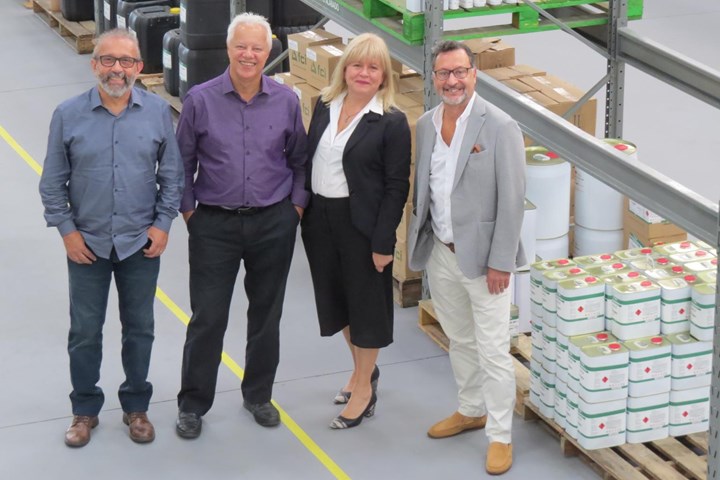Marbocote, FCI partnership expands release agent options in Brazil
U.K.-based Marbocote’s Valinhos, Brazil, unit will provide FCI local access to resins and reduce its dependence on importing.

Roberto Iacovella (Redelease), Rubens Cruz (Redelease), Ana Clara Cordeiro (FCI) and Ian Snowdon (Marbocote)
A partnership started in 2016 between release agent manufacturers FCI (São Paulo, Brazil) and Marbocote (Middlewich, U.K.) has reached a milestone as Marbocote opened a unit in Valinhos, São Paulo), the first outside the U.K., which will nationalize the resins used as bases for release agents and provide FCI with a local source. Further, FCI, which manufactured Marbocote's products under license, will stop importing the main raw materials, resulting in cost reduction and greater bargaining power with its customers.
“Despite the crisis caused by the pandemic, we are very optimistic. We have already obtained good results, but now, with local access to resins, we will be able to offer to the Brazilian market release agents options that combine globally recognized quality and cost-effectiveness,” says Ana Clara Cordeiro, commercial director of FCI.
According to Ian Snowdon, director of Marbocote, the Valinhos unit will be dedicated to product development, focusing mainly on the automotive market. “We see great opportunities in Brazil. In addition to the plant already operated by FCI, we will have a hub for the production of release agents in the country with global structure and technology.”
With this opportunity, says Clara, seven main market segments appear for FCI, including foundry, polyurethane, rubber, tires, wood, plastics and composites. “At the outset, we offer a portfolio with 150 release agents, including semi-permanent, silicone-free, water- or solvent-based. However, local manufacturing allows us to customize as many formulations as necessary,” she says. Depending on volume, FCI’s release agents are sold through Redelease, a Brazilian chemical distributor,
Related Content
-
Composites end markets: Automotive (2024)
Recent trends in automotive composites include new materials and developments for battery electric vehicles, hydrogen fuel cell technologies, and recycled and bio-based materials.
-
Thermoset-thermoplastic joining, natural fibers enable sustainability-focused brake cover
Award-winning motorcycle brake disc cover showcases potential for KTM Technologies’ Conexus joining technology and flax fiber composites.
-
Plant tour: Joby Aviation, Marina, Calif., U.S.
As the advanced air mobility market begins to take shape, market leader Joby Aviation works to industrialize composites manufacturing for its first-generation, composites-intensive, all-electric air taxi.








.jpg;maxWidth=300;quality=90)




